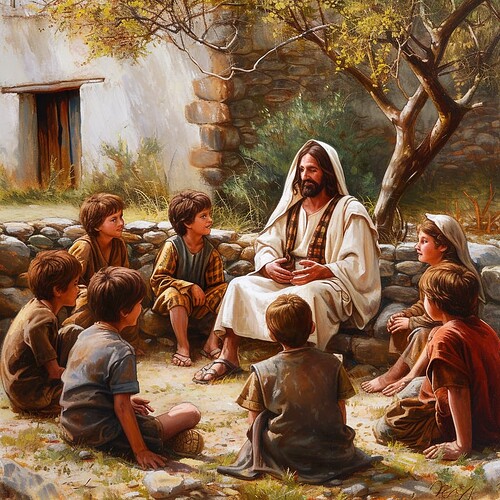 February 14: Mark 10 - The Price of Discipleship
February 14: Mark 10 - The Price of Discipleship
The Call to Servant Leadership & the Definition of True Riches.
 Introduction
Introduction
In Mark 10, we see Jesus redefining conventional wisdom, challenging societal norms, and reshaping our understanding of success.
 Jesus and the Little Children (Mark 10:13-16)
Jesus and the Little Children (Mark 10:13-16)
Jesus emphasizes the value of childlike faith and humility. He makes it clear that the Kingdom of God belongs to those who possess such qualities.
![]() Key Verse: “Truly I tell you, anyone who will not receive the kingdom of God like a little child will never enter it.” (Mark 10:15)
Key Verse: “Truly I tell you, anyone who will not receive the kingdom of God like a little child will never enter it.” (Mark 10:15)
 Jesus on Divorce (Mark 10:2-12)
Jesus on Divorce (Mark 10:2-12)
Jesus takes us back to God’s original intent for marriage and emphasizes the permanence of the marriage covenant.
![]() Key Verse: “What God has joined together, let no one separate.” (Mark 10:9)
Key Verse: “What God has joined together, let no one separate.” (Mark 10:9)
 The Rich Young Man (Mark 10:17-27)
The Rich Young Man (Mark 10:17-27)
A rich young ruler seeks eternal life but struggles to surrender his earthly riches. Jesus reveals that true treasure lies beyond material possessions.
![]() Key Verse: “It is easier for a camel to go through the eye of a needle than for someone who is rich to enter the kingdom of God.” (Mark 10:25)
Key Verse: “It is easier for a camel to go through the eye of a needle than for someone who is rich to enter the kingdom of God.” (Mark 10:25)
 Key Themes and Reflections
Key Themes and Reflections
- True Wealth: Earthly riches, although attractive, will not earn us a ticket into God’s kingdom. Instead, we must pursue spiritual wealth by being generous and obedient to God’s commandments.
- Servant Leadership: Leadership in God’s kingdom contrasts starkly with secular power dynamics. It calls for service and selflessness.
 Today’s Application
Today’s Application
Are we clinging onto our earthly riches, unwilling to let go and fully trust in God? Let’s reassess our priorities and seek true riches in Christ.
 Hidden Gem
Hidden Gem
In Mark 10:29-30, Jesus unveils the “hundredfold promise.” It reveals that whatever sacrifices we make for Christ’s sake will be rewarded exceedingly in this life and the next.
 Reflective Q&A
Reflective Q&A
![]() What does childlike faith look like?:
What does childlike faith look like?:
A: A childlike faith represents utter dependence, trust, humility, and receptiveness.
![]() Why must we redefine success?
Why must we redefine success?
A: True success lies in fulfilling God’s will and becoming followers of Christ, not just admirers.
![]() How does Jesus redefine leadership?"
How does Jesus redefine leadership?"
A: According to Jesus, true leadership means becoming a servant and humbling ourselves.
 Join the Discussion
Join the Discussion
What kind of “riches” are you pursuing? Share your reflections on today’s reading.
![]() See You Tomorrow in Mark 11
See You Tomorrow in Mark 11
We’ll delve into Jesus’ triumphant entry into Jerusalem. Don’t miss this powerful moment in Jesus’ ministry. Join us in our journey through the Scriptures tomorrow.
